Varimax 20 Tablet 4's
MRP ₹410.5
(Inclusive of all Taxes)
₹61.6 Cashback (15%)
Provide Delivery Location
Online payment accepted
 Prescription drug
Prescription drugWhats That
Composition :
Manufacturer/Marketer :
Consume Type :
Expires on or after :
Return Policy :
About Varimax 20 Tablet
Varimax 20 Tablet belongs to the group of medicines called phosphodiesterase type-5 inhibitors primarily used to treat erectile dysfunction. Erectile dysfunction is the inability to keep a hard and erect penis suitable for sexual activity. Varimax 20 Tablet does not prevent pregnancy or the spread of sexually transmitted diseases. It does not increase sexual desire or cure erectile dysfunction.
Varimax 20 Tablet contains ‘vardenafil’, which works by relaxing the blood vessels in the penis, thereby allowing the blood to flow into the penis when the person is sexually excited. It reduces the action of natural chemicals in the body, which makes erections go away. Thereby, Varimax 20 Tablet helps treat erectile dysfunction. Varimax 20 Tablet helps the person to get an erection only if he is sexually stimulated.
You are advised to take Varimax 20 Tablet for as long as your doctor has prescribed it for you, depending on your medical condition. In some cases, you may experience certain common side-effects such as headache, dizziness, flushing, indigestion, and runny nose. Most of these side effects do not require medical attention and will resolve gradually over time. However, you are advised to talk to your doctor if you experience these side effects persistently.
Do not take Varimax 20 Tablet if you are taking nitrates (used to treat angina), or riociguat (used to treat pulmonary hypertension); if you have heart problems/stroke or low blood pressure. Varimax 20 Tablet is not intended for use in women. Varimax 20 Tablet may cause dizziness, so drive with caution. Avoid consuming alcohol as it might make erectile difficulties worse. Varimax 20 Tablet is not recommended for children below 18 years. Keep your doctor informed about your health condition and the medicines you are taking to avoid unpleasant side effects.
Uses of Varimax 20 Tablet
Directions for Use
Key Benefits
Varimax 20 Tablet belongs to the group of medicines called phosphodiesterase type-5 inhibitors primarily used to treat erectile dysfunction (impotence). Varimax 20 Tablet works by relaxing the blood vessels in the penis, thereby allows the blood to flow into the penis when the person is sexually excited. It reduces the action of natural chemicals in the body, which make erections go away. Thereby, Varimax 20 Tablet helps treat erectile dysfunction. Varimax 20 Tablet helps the person to get an erection only if he is sexually stimulated.
Storage
- Consult your doctor if you experience skin redness, itching, or irritation after taking medication.
- Your doctor may adjust your treatment plan by changing your medication or providing guidance on managing your erythema symptoms.
- Your doctor may recommend or prescribe certain medications to help alleviate symptoms.
- Apply cool compresses or calamine lotion to the affected skin area to reduce redness and itching.
- Stay hydrated by drinking plenty of water to help alleviate symptoms and keep your skin hydrated.
- Monitor your skin condition closely and promptly report any changes, worsening symptoms, or concerns to your healthcare provider.
- Hydrate your body: Drink enough water to prevent dehydration and headaches.
- Calm Your Mind: Deep breathing and meditation can help you relax and relieve stress.
- Rest and Recharge: Sleep for 7-8 hours to reduce headache triggers.
- Take rest: lie down in a quiet, dark environment.
- Cold or warm compresses can help reduce tension.
- Stay Upright: Maintain good posture to keep symptoms from getting worse.
- To treat headaches naturally, try acupuncture or massage therapy.
- Over-the-counter pain relievers include acetaminophen and ibuprofen.
- Prescription Assistance: Speak with your doctor about more substantial drug alternatives.
- Severe Headaches: Seek emergency medical assistance for sudden, severe headaches.
- Frequent Headaches: If you get reoccurring headaches, consult your doctor.
- Headaches with Symptoms: Seek medical attention if your headaches include fever, disorientation, or weakness.
- Consult your doctor if you experience symptoms of sinusitis, such as nasal congestion, facial pain, or headaches, which may be triggered by your medication.
- Your doctor may adjust your treatment plan by changing your medication, adding new medications, or providing guidance on managing your sinusitis symptoms.
- Practice good hygiene, including frequent handwashing, avoiding close contact with others, and avoiding sharing utensils or personal items.
- If your doctor advises, you can use nasal decongestants or saline nasal sprays to help relieve nasal congestion and sinus pressure.
- To help your body recover, get plenty of rest, stay hydrated, and engage in stress-reducing activities. If your symptoms persist or worsen, consult your doctor for further guidance.
- Inform your doctor about the nausea and discuss possible alternatives to the medication or adjustments to the dosage.
- Divide your daily food intake into smaller, more frequent meals to reduce nausea.
- Opt for bland, easily digestible foods like crackers, toast, plain rice, bananas, and applesauce.
- Avoid certain foods that can trigger nausea, such as fatty, greasy, spicy, and smelly foods.
- Drink plenty of fluids, such as water, clear broth, or electrolyte-rich beverages like coconut water or sports drinks.
- Use ginger (tea, ale, or candies) to help relieve nausea.
- Get adequate rest and also avoid strenuous activities that can worsen nausea.
- Talk to your doctor about taking anti-nausea medication if your nausea is severe.
- Record when your nausea occurs, what triggers it, and what provides relief to help you identify patterns and manage your symptoms more effectively.
- Inform your doctor about dizziness symptoms. They may adjust your medication regimen or prescribe additional medications to manage symptoms.
- Follow your doctor's instructions for taking medication, and take it at the same time every day to minimize dizziness.
- When standing up, do so slowly and carefully to avoid sudden dizziness.
- Avoid making sudden movements, such as turning or bending quickly, which can exacerbate dizziness.
- Drink plenty of water throughout the day to stay hydrated and help alleviate dizziness symptoms.
- If you're feeling dizzy, sit or lie down and rest until the dizziness passes.
- Track when dizziness occurs and any factors that may trigger it, and share this information with your doctor to help manage symptoms.
- Consult your doctor if you experience nasal congestion, runny nose, or sinus pressure after taking medication.
- Your doctor may adjust your treatment plan by changing your medication, adding new medications, or providing guidance on managing your rhinitis symptoms.
- If advised by your doctor, use nasal decongestants or saline nasal sprays to help relieve nasal congestion.
- Practice good hygiene, including frequent handwashing, avoiding close contact with others, and avoiding sharing utensils or personal items.
- Stay hydrated by drinking plenty of water and other fluids to help thin out mucus and soothe your nasal passages.
- Take medications with food (if recommended): It can help prevent stomach distress and indigestion.
- Eat smaller, more frequent meals: Divide daily food intake into smaller, more frequent meals to ease digestion.
- Avoid trigger foods: Identify and avoid foods that trigger indigestion, such as spicy, fatty, or acidic foods.
- Stay upright after eating: Sit or stand upright for at least 1-2 hours after eating to prevent stomach acid from flowing into the oesophagus.
- Avoid carbonated drinks: Avoid drinking carbonated beverages, such as soda or beer, which can worsen indigestion.
- Manage stress: To alleviate indigestion, engage in stress-reducing activities like deep breathing exercises or meditation.
- Consult a doctor if needed: If indigestion worsens or persists, consult a healthcare professional to adjust the medication regimen or explore alternative treatments.
Drug Warnings
Do not take Varimax 20 Tablet if you are allergic to any of its components; if you are taking nitrates (used to treat angina), riociguat (used to treat pulmonary hypertension), medicines used to treat HIV, if you are over 75 years and are taking antifungal medicines; if you have/had severe heart problems or liver problems, kidney dialysis, recently had a heart attack or stroke, low blood pressure, degenerative eye diseases, or non-arteritic ischemic optic neuropathy. Inform your doctor if you have heart problems, irregular heart rhythm, priapism (prolonged erection), sickle cell anaemia, multiple myeloma, leukaemia, epilepsy, deformed penis shape, low levels of potassium in the blood, stomach ulcers, or bleeding disorders. Consult your doctor immediately if you experience decreased vision, loss of vision or colour vision changes whilst taking Varimax 20 Tablet. Varimax 20 Tablet is not intended for use in women and children below 18 years. Varimax 20 Tablet may cause dizziness, so drive with caution.
Drug-Drug Interactions
Drug-Drug Interactions
Login/Sign Up
Taking Varimax 20 Tablet with Riociguat may significantly lower the blood pressure.
How to manage the interaction:
Taking Riociguat with Varimax 20 Tablet is not recommended, but it can be taken together if prescribed by a doctor. However, consult your doctor if you experience sudden dizziness, lightheadedness, fainting, flushing, headache, and nasal congestion. Do not discontinue any medications without consulting a doctor.
Taking Varimax 20 Tablet and glyceryl trinitrate together can increase the risk or severity of low blood pressure.
How to manage the interaction:
Combining Varimax 20 Tablet and glyceryl trinitrate is generally avoided as it can lead to an interaction, but it can be taken if your doctor has advised it. However, if you experience symptoms like dizziness, lightheadedness, fainting, headache, flushing, heart palpitations, and priapism (prolonged and painful erection unrelated to sexual activity), consult your doctor immediately. Do not discontinue any medications without consulting your doctor.
Taking Varimax 20 Tablet with Nitroprusside can cause blood pressure to fall excessively.
How to manage the interaction:
Coadministration of Varimax 20 Tablet with Nitroprusside is generally avoided, but it can be taken when prescribed by your doctor. If you experience any side effects such as dizziness, lightheadedness, headache, or irregular palpitations you should seek immediate medical attention. Do not discontinue any medications without first consulting your doctor.
Co-administration of Varimax 20 Tablet with Ziprasidone can increase the risk of irregular heart rhythm.
How to manage the interaction:
Taking Varimax 20 Tablet with Ziprasidone together can possibly result in an interaction, but it can be taken if a doctor has advised it. However, consult a doctor immediately if you experience any symptoms such as sudden dizziness, lightheadedness, fainting, shortness of breath, or heart palpitations. Do not discontinue any medications without consulting a doctor.
Taking amisulpride with Varimax 20 Tablet increases the risk of an abnormal heart rhythm.
How to manage the interaction:
Although taking amisulpride along with Varimax 20 Tablet can result in an interaction, it can be taken if a doctor has advised it. However, if you experience abrupt dizziness, lightheadedness, fainting, shortness of breath, or rapid heartbeat, consult a doctor immediately. Do not discontinue any medications without a doctor's advice.
Taking Varimax 20 Tablet with Ceritinib may increase the risk of irregular heart rhythm.
How to manage the interaction:
Co-administration of Ceritinib with Varimax 20 Tablet can possibly result in an interaction, but it can be taken together if prescribed by a doctor. However, consult your doctor if you experience sudden dizziness, lightheadedness, fainting, shortness of breath. Do not discontinue any medications without consulting a doctor.
The combined use of Varimax 20 Tablet and haloperidol can increase the risk of an irregular heart rhythm.
How to manage the interaction:
Co-administration of Varimax 20 Tablet and Haloperidol can lead to an interaction, but it can be taken if your doctor advises. However, if you experience any symptoms like sudden dizziness, lightheadedness, fainting, shortness of breath, heart palpitations, diarrhea, or vomiting, contact your doctor immediately. Do not discontinue any medications without consulting your doctor.
Co-administration of Varimax 20 Tablet with mifepristone can increase the risk of irregular heart rhythms.
How to manage the interaction:
Taking Varimax 20 Tablet with mifepristone together can result in an interaction, it can be taken if a doctor has advised it. However, contact a doctor immediately if you experience any symptoms such as dizziness, lightheadedness, fainting, shortness of breath, or irregular heartbeat. Do not discontinue any medications without consulting a doctor.
When Varimax 20 Tablet is taken with Clozapine, it may increase the risk of irregular heart rhythm.
How to manage the interaction:
Although taking Clozapine and Varimax 20 Tablet together can evidently cause an interaction, it can be taken if your doctor has suggested it. It's important to keep an eye on your qt interval. If you notice any of these symptoms - an irregular heart rhythm, severe or prolonged diarrhea, vomiting, complications, sudden dizziness, lightheadedness, fainting, shortness of breath or heart palpitations - make sure to call your doctor right away. Do not stop using any medications without a doctor's advice.
Taking Efavirenz with Varimax 20 Tablet can increase the risk or severity of irregular heart rhythms. The risk increases in patients with a history of heart illness or electrolyte imbalance.
How to manage the interaction:
Taking Efavirenz with Varimax 20 Tablet together can result in an interaction, it can be taken if your doctor has advised it. However, if you experience sudden dizziness, lightheadedness, fainting, shortness of breath, chest pain or tightness, rapid heartbeat, or memory loss, contact a doctor immediately. Do not discontinue any medications without consulting a doctor.
Drug-Food Interactions
Drug-Food Interactions
Login/Sign Up
Diet & Lifestyle Advise
- Maintaining a healthy weight, eating a balanced diet, and regular exercising may help you manage erectile dysfunction.
- Avoid the consumption of alcohol, as it might make erectile difficulties worse.
- Avoid the usage of tobacco.
- Share intimate time with your partner.
- Stay sexually active to prevent further problems with erectile dysfunction.
Side Effects of Varimax 20 Tablet
- Headache
- Dizziness
- Flushing
- Indigestion
- Runny nose
- Nausea
- Back pain
- Stomach upset
Habit Forming
Therapeutic Class
All Substitutes & Brand Comparisons
RX
Out of StockValif 20 Tablet
Ajanta Pharma Ltd
₹34.9
(₹3.14 per unit)
96% CHEAPERRX
Out of StockLevifil 20mg Tablet
₹199
(₹17.91 per unit)
80% CHEAPERRX
Varplay-20 Tablet 10's
Jupiter Biolabs Pvt Ltd
₹490
(₹44.1 per unit)
52% CHEAPER
Author Details
We provide you with authentic, trustworthy and relevant information
Drug-Diseases Interactions
Drug-Diseases Interactions
Login/Sign Up
FAQs
Varimax 20 Tablet works by relaxing the blood vessels in the penis, thereby allows the blood to flow into the penis when the person is sexually excited.
No, do not take Varimax 20 Tablet with nitrates. Taking Varimax 20 Tablet with medicines used to treat angina/chest pain such as nitrates/nitroglycerin, isosorbide dinitrate, glyceryl trinitrate, amyl nitrite, or isosorbide mononitrate, may cause severe lowering of blood pressure. You are advised not to take Varimax 20 Tablet if you are taking nitrates or if you have a history of heart problems.
Varimax 20 Tablet increases the hypotensive effect of riociguat. Therefore, avoid taking Varimax 20 Tablet if you are taking riociguat, a medicine used to treat pulmonary arterial hypertension/high blood pressure in the lungs.
It usually takes 30-60minutes for Varimax 20 Tablet to show its effect. Take Varimax 20 Tablet 25-60minutes before sexual activity. You should be able to get an erection at any time from 25 minutes up to 4-5hours after taking Varimax 20 Tablet. However, you need to be sexually excited for Varimax 20 Tablet to work.
Avoid taking Varimax 20 Tablet if you have/had hypotension (low blood pressure), stroke, heart attack or heart problems. Talk to your doctor if you have any concerns.
Drug-Drug Interactions Checker List
- NITROGLYCERIN
- AMYL NITRITE
- RIOCIGAUT
- QUINIDINE
- PROCAINAMIDE
- AMIODARONE
- SOTALOL
- KETOCONAZOLE
- ITRACONAZOLE
- TAMSULOSIN
- TERAZOSIN
- ALFUZOSIN
- RITONAVIR
- INDINAVIR
- NIFEDIPINE
Special Advise
- Do not take Varimax 20 Tablet more than once in a day. Take Varimax 20 Tablet only as prescribed by the doctor.
- Talk to your doctor if the erection persists for greater than four hours or if you have a painful erection.
Disease/Condition Glossary
Erectile dysfunction: It is the inability to keep a hard and erect penis suitable for sexual intercourse. It could be a sign of physical or psychological conditions such as fear of sexual failure, anxiety, depression, low self-esteem, or stress. Certain health-related factors such as smoking, drinking, being overweight, being physically inactive, and high blood pressure also contribute to erectile dysfunction. Symptoms of erectile dysfunction include difficulty in getting an erection, difficulty in maintaining the erection during intercourse and decreased sexual desire.

Have a query?
Alcohol
Safe if prescribed
You are advised not to consume alcohol as it might make erectile difficulties worse.
Pregnancy
Consult your doctor
Varimax 20 Tablet is not intended for use by women.
Breast Feeding
Consult your doctor
Varimax 20 Tablet is not intended for use by women.
Driving
Safe if prescribed
Varimax 20 Tablet may cause dizziness and vision problems. Therefore you are advised to drive and operate machinery only if you are alert.
Liver
Consult your doctor
Please consult your doctor if you have liver impairment/liver disease or any concerns regarding this. Avoid taking Varimax 20 Tablet if you have severe liver problems.
Kidney
Consult your doctor
Dose adjustment may be needed in patients with severe renal impairment. Please consult your doctor if you have kidney impairment/kidney disease or any concerns regarding this.
Children
Safe if prescribed
Varimax 20 Tablet is not recommended for children below 18 years as safety and effectiveness have not been established.
Recommended for a 30-day course: 4 Strips

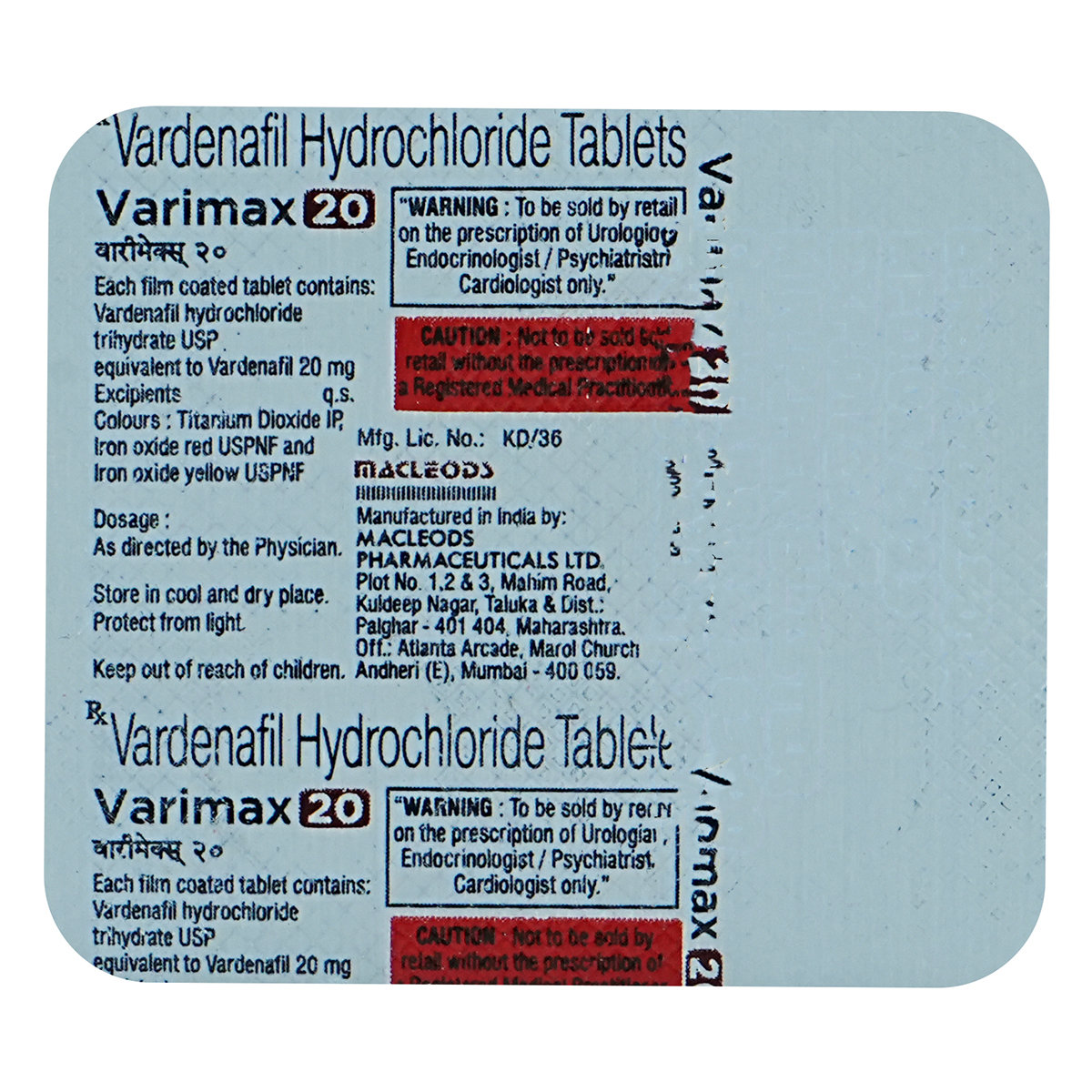
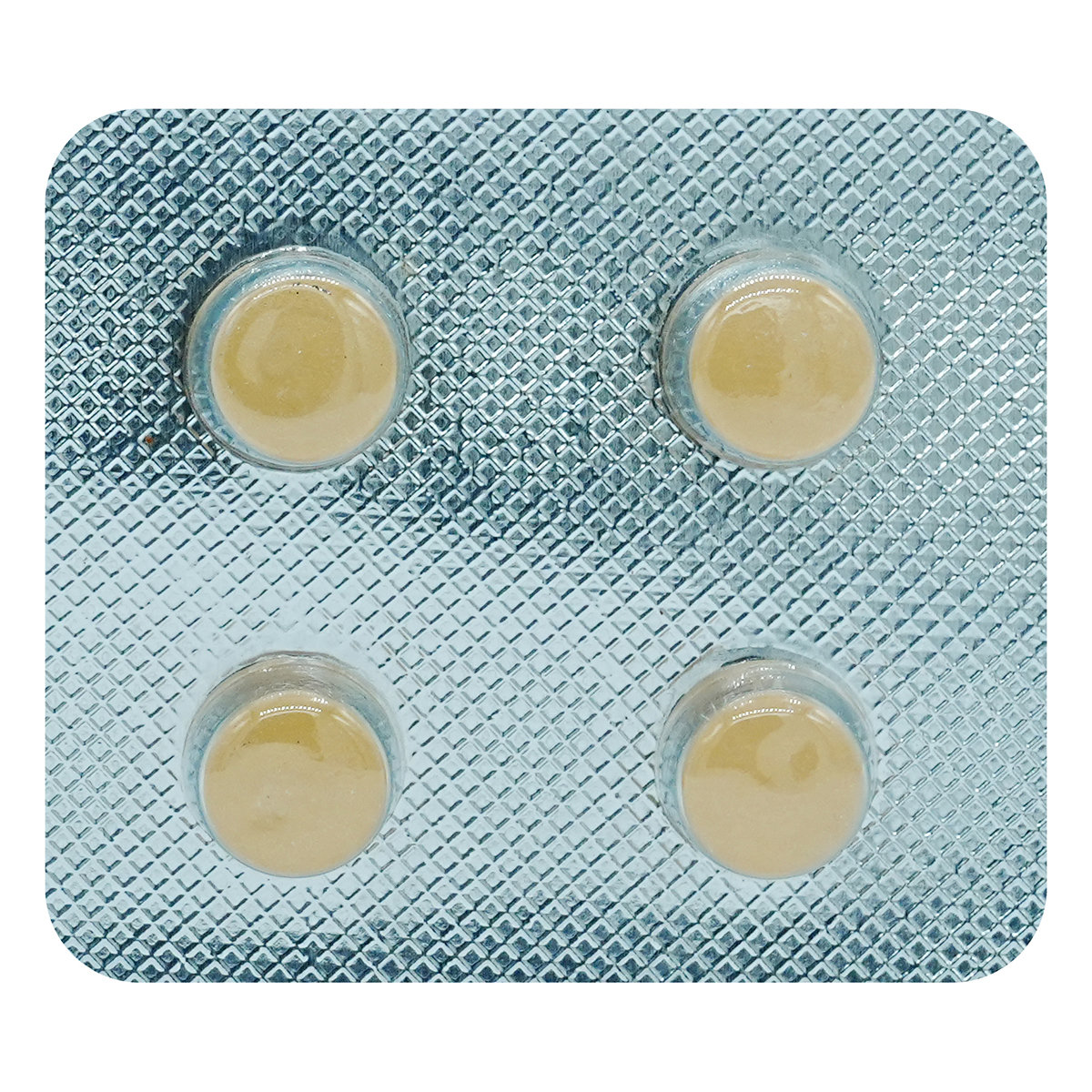
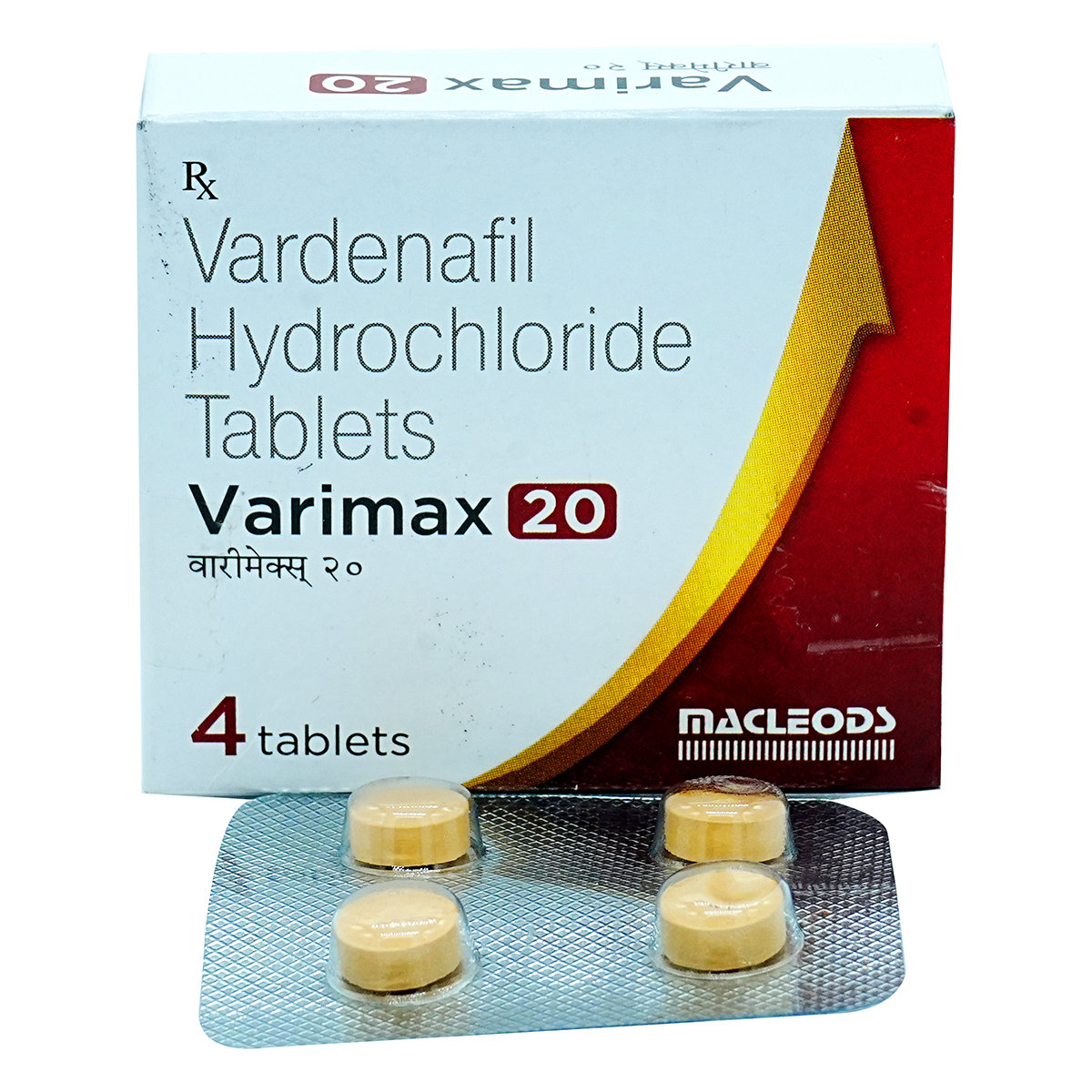
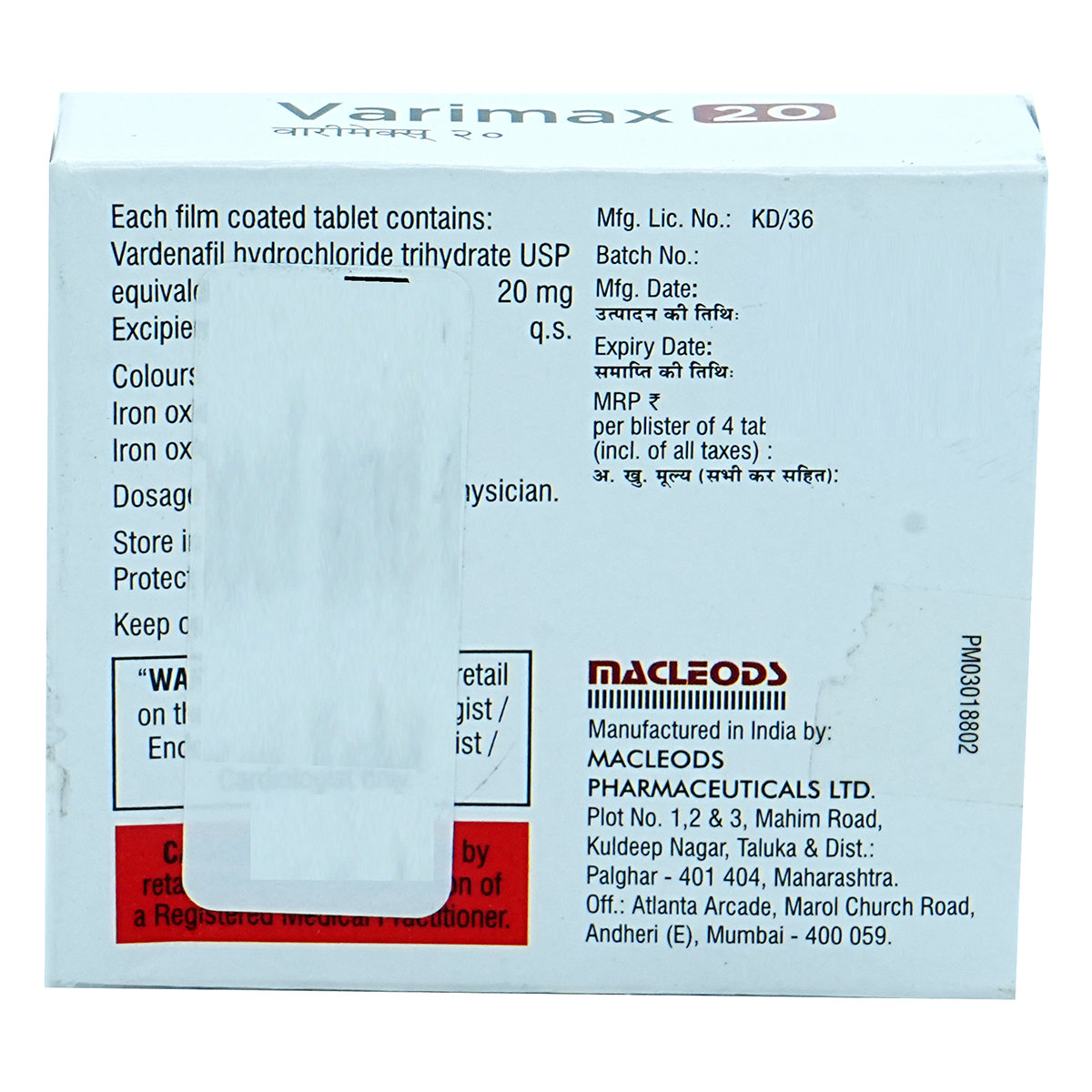
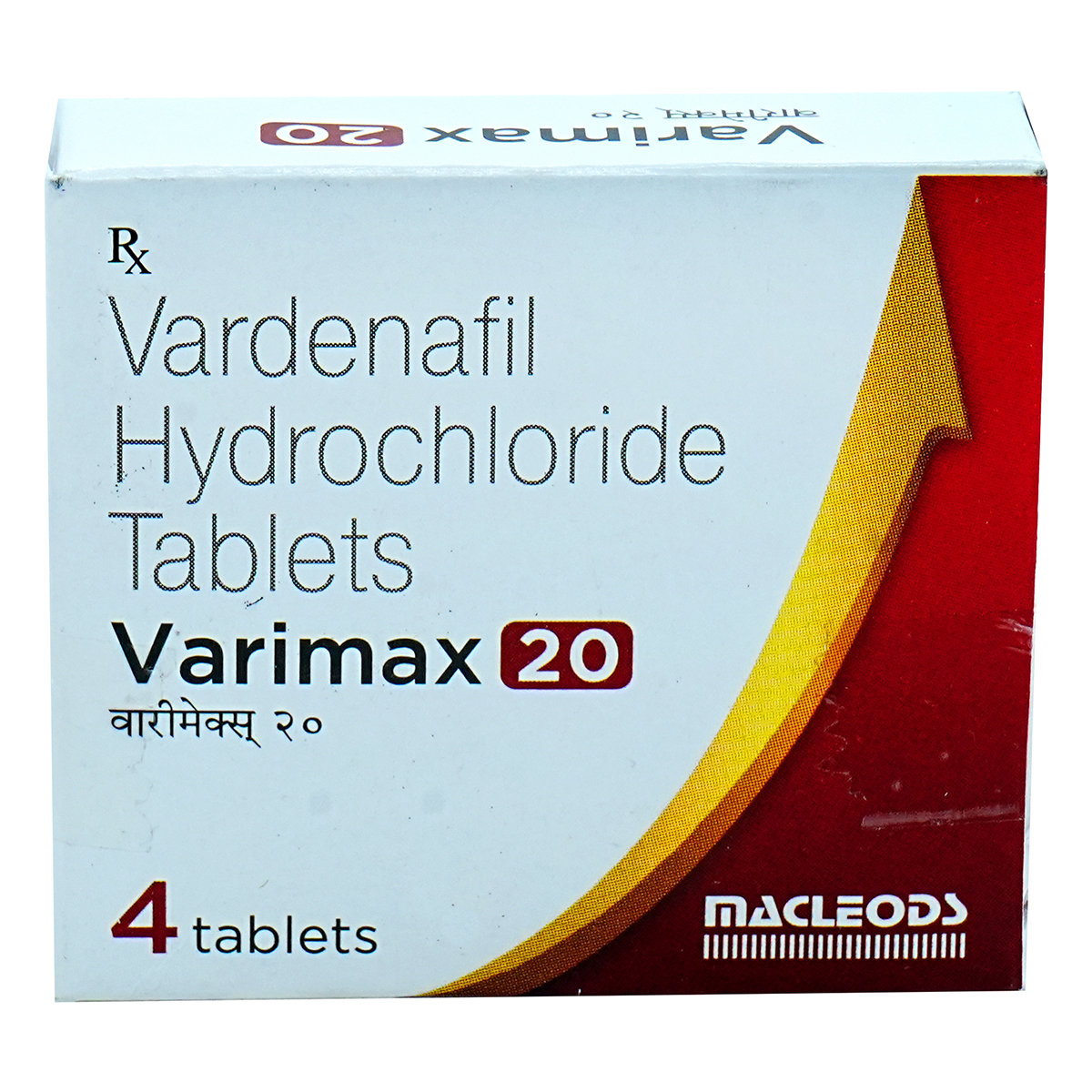









_0.jpg?tr=q-85)

